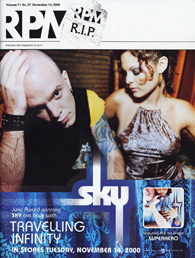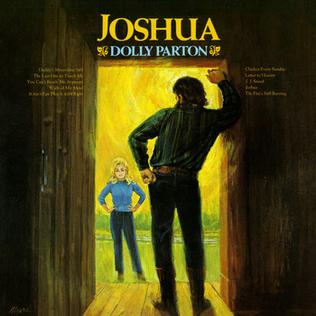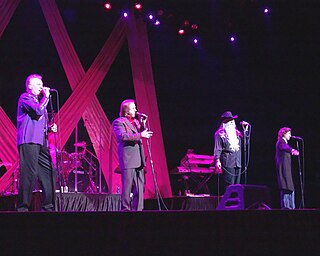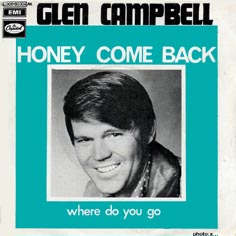These are the Canadian number-one country songs of 1970, per the RPM Country Tracks chart.
These are the Canadian number-one country songs of 1970, per the RPM Country Tracks chart.
Soft rock, also known as light rock and adult-oriented rock, is a derivative form of pop rock that originated in the late 1960s in the U.S. region of Southern California and in the United Kingdom. The style smoothed over the edges of singer-songwriter and pop rock, relying on simple, melodic songs with big, lush productions. Soft rock was prevalent on the radio throughout the 1970s and eventually metamorphosed into a form of the synthesized music of adult contemporary in the 1980s.
"Always on My Mind" is a ballad written by Wayne Carson, Johnny Christopher, and Mark James, first recorded by Brenda Lee, Gwen McCrae, and Elvis Presley, and first released by McCrae in 1972. The song has been a crossover hit, charting in both the country and western and pop categories.

"One Tin Soldier" is a 1960s counterculture era anti-war song written by Dennis Lambert and Brian Potter. Canadian pop group The Original Caste first recorded it in 1969 for both the TA label and its parent Bell label.

RPM was a Canadian music-industry publication that featured song and album charts for Canada. The publication was founded by Walt Grealis in February 1964, supported through its existence by record label owner Stan Klees. RPM ceased publication in November 2000.

Joshua is the seventh solo studio album by American singer-songwriter Dolly Parton. It was released on April 12, 1971, by RCA Victor. The album was produced by Bob Ferguson. It peaked at number 16 on the Billboard Top Country Albums chart and number 198 on the Billboard 200 chart. The album's single, "Joshua", was nominated for a Grammy and was Parton's first song to reach number one on the Billboard Hot Country Songs chart.

"It's Only Make Believe" is a song written by drummer Jack Nance and Mississippi-born singer Conway Twitty, while both were touring across Ontario, Canada in 1958. The song was recorded on May 7 for MGM Records; produced by Jim Vienneau, it featured Floyd “Lightnin’” Chance on double bass. It was released on side B of "I'll Try" on July 14, 1958. Known as Harold Lloyd Jenkins until changing his name in 1957, Twitty was a relatively unknown rock n' roll singer at the time. That all changed when side B finally hit the chart in September, then made No. 1 twice, on November 10 and 24. The single topped both U.S. and the UK Singles Chart, and became the only No. 1 pop single of his career. Years later, on a segment of 'Pop Goes The Country', Twitty stated it was a hit in 22 different countries, and sold over 8 million copies. He did not become a country music star until he crossed over in 1966.

"My Maria" is a song co-written by B. W. Stevenson and Daniel Moore. Stevenson released "My Maria" as a single in August 1973, and the song became a Top 10 hit, peaking at number 9 on the US pop chart. It remained in the Top 40 for twelve weeks. In addition, "My Maria" spent one week at number 1 on the US adult contemporary chart. The guitar portion of the track was played by Larry Carlton. A cover version by Brooks & Dunn reached number 1 on the US country music chart and won the 1997 Grammy for Country Performance by a Duo or Group with Vocal.
"By the Time I Get to Phoenix" is a song written by Jimmy Webb. Originally recorded by Johnny Rivers in 1965, it was covered by American country music singer Glen Campbell on his album of the same name. Released on Capitol Records in 1967, Campbell's version topped RPM's Canada Country Tracks, reached number two on Billboard's Hot Country Singles chart, and won two awards at the 10th Annual Grammys. Broadcast Music, Inc. (BMI) named it the third most performed song from 1940 to 1990. The song was ranked number 20 on BMI's Top 100 Songs of the Century. Frank Sinatra called it "the greatest torch song ever written."

The Oak Ridge Boys are an American musical group. Originally a gospel quartet, The Oak Ridge Boys switched their focus to secular country music in the mid-1970s, releasing a string of hit albums and singles that lasted into the early 1990s. Their discography comprises thirty-one studio albums and fifty-six singles. Their highest-selling album is 1981's Fancy Free, which is certified double-platinum by the Recording Industry Association of America (RIAA).
Dan Seals was an American country music artist. Formerly one half of the pop duo England Dan & John Ford Coley, Seals split from the duo in 1980 and began a country music career. As a solo artist, Seals released 13 studio albums, six compilation albums, and 37 singles. Eleven of his singles reached Number One on the U.S. Billboard country singles charts, including nine consecutive Number Ones between 1985 and 1989. Seals' best-selling album in the U.S. is 1987's The Best, certified platinum by the RIAA.
"Bop" is a song written by Paul Davis and Jennifer Kimball and recorded by American country music artist Dan Seals. It was released in October 1985 as the second single from his fifth studio album, Won't Be Blue Anymore. It reached number one on the US Billboard Hot Country Singles chart in early 1986, becoming his second number-one hit on that chart and his first as a solo artist. It was a major crossover hit as well, peaking at number 42 on the Billboard Hot 100 and at number 10 on the Adult Contemporary chart. In Canada, it topped the RPM Top Singles and Country Singles charts.
"The Tip of My Fingers," also titled "The Tips of My Fingers," is a song written and originally recorded by American country music singer Bill Anderson. First included on his 1962 album Bill Anderson Sings Country Heart Songs, the song was a Top Ten country single for him in 1960. It was recorded by UK singer Karl Denver in 1966 and also by UK singer Des O'Connor in 1970 reaching number 15 in the UK singles chart.
"Dream On" is a song written by Dennis Lambert and Brian Potter. In 1974, The Righteous Brothers had a hit version, reaching No. 32 on the Billboard Hot 100, and No. 6 on the U.S. and Canadian Adult Contemporary charts. Bill Medley and Bobby Hatfield alternate lead vocals.
"She's a Little Bit Country" is a single by American country music artist George Hamilton IV. Released in March 1970, it was the second single from his album Back Where It's At. The song peaked at number 3 on the Billboard Hot Country Singles chart. It also reached number 1 on the RPM Country Tracks chart in Canada. The single was covered by singer Dean Martin, reaching #36 on Billboard's Easy Listening chart, May 1971.
"Everything a Man Could Ever Need" is a song written by Mac Davis, and recorded by American country music artist Glen Campbell. It was released in June 1970 as the first single from his album Norwood. The song peaked at number 5 on the Billboard Hot Country Singles chart. It also reached number 1 on the RPM Country Tracks chart in Canada.

"Honey Come Back" is a song written by Jimmy Webb, and recorded by the American country music artist Glen Campbell. It was released in January 1970 as the second single from his album Try a Little Kindness. The song peaked at number 2 on the Billboard Hot Country Singles chart. It also reached number 1 on the RPM Country Tracks chart in Canada.
"What Is Truth" is a song written and recorded by American country music artist Johnny Cash released in February 1970. Generally viewed as a protest song, a rarity in country music at the time, its criticism of the Vietnam War and the generation gap made the song a major crossover hit. The song peaked at number 3 on the Billboard Hot Country Singles. It also became Cash's 12th Top 40 single on the Hot 100 chart, peaking at number 19, and his 2nd Top 10 single on the Adult Contemporary chart, peaking at Number 4. It also reached number 1 on the RPM Country Tracks chart in Canada, and number 21 on the UK Singles Chart. Cash played this song in front of Richard Nixon in the White House on April 17, 1970.
"A Good Year for the Roses" is a ballad written by Jerry Chesnut and originally recorded by American country singer George Jones. It rose to #2 on the country singles chart in 1970.